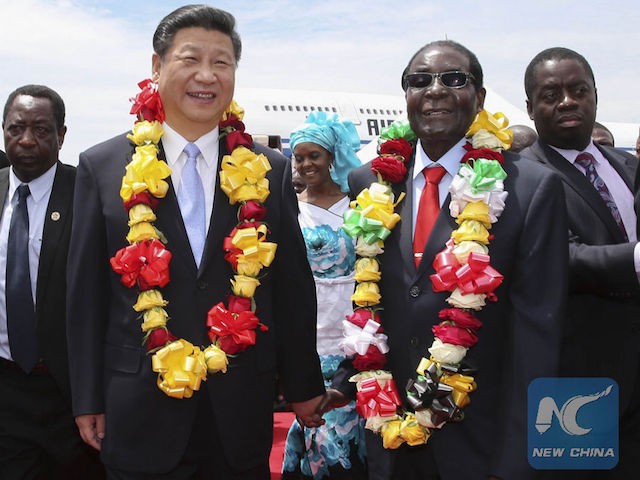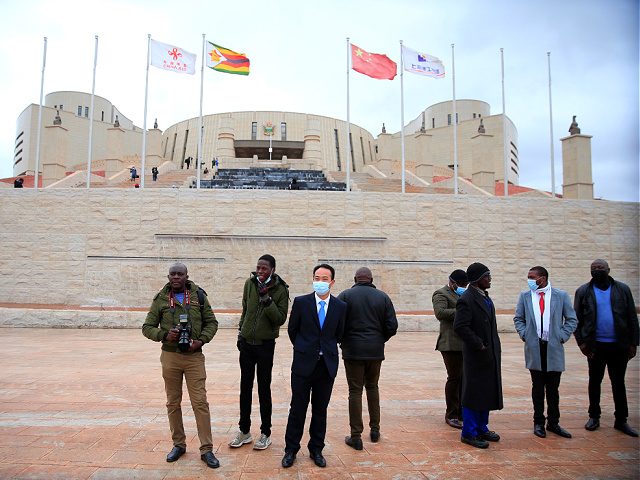The Zimbabwe Congress of Trade Unions (ZCTU), the largest trade federation in that African nation, on Wednesday warned that government officials are covering up massive violations of workers’ rights by Chinese companies.
ZCTU acting president Nicholas Mazarura said abuses by Chinese employers included paying less than the industrial minimum wage, forcing employees to work without adequate protective equipment, charging workers for their own protective gear when it was provided, failing to provide medical care, and violating numerous health and safety regulations — including chemical and biological hazards
Mazarura accused Chinese companies of using “public relations” funds to bribe government officials to thwart oversight.
“We take this opportunity to warn individuals in high offices and those masquerading as consultants who are in connivance with the Chinese to enslave and subject workers to some of the worst treatment observed since 1980 that the tide will rise against them soon,” Mazarura said.
The early 1980s were watershed years in the Zimbabwean labor movement, as workers organized against dramatic abuses and extremely poor working conditions. Zimbabwe joined the International Labor Organization in 1980, and the ZCTU was founded soon afterward.
Mazarura recalled how Zimbabwe’s “Second Republic,” the government formed after the fall of longtime dictator Robert Mugabe in 2017, declared its intention to become a haven for foreign investment. He accused the Chinese of treating that invitation as an opportunity to exploit Zimbabwean workers.

File photo shows Chinese President Xi Jinping welcomed by Zimbabwean President Robert Mugabe in Harare, Zimbabwe, Dec. 1, 2015. (Xinhua/Lan Hongguang)
“It was not a call for the destruction of workers’ physical, mental and social wellbeing through failure to adhere to basic fundamental labor standards. The gravity of union busting by the Chinese is posing an existential threat to the labor movement and must be met with equal measure,” he declared.
“We cannot sit and watch while workers are being abused. We are calling on the responsible ministries to quickly institute measures to curb the Chinese offensive attack and correct the situation,” he said.
A formal complaint was made public this week against an example of the corruption Mazarura denounced. An Italian investor named Francesco Marconati, whose shoe company supplies the Zimbabwean military and police with footwear and other gear, accused assistant police commissioner Jealous Nyabasa and his subordinates of protecting a well-connected Chinese national named Li Song from fraud and forgery investigations.
Marconati said he filed such charges against Song one year ago, but no investigation of the Chinese woman has been conducted, and only incomplete records were supplied by Nyabasa’s department when prosecutors requested documentation.
On the other hand, Marconati said a squad of detectives investigated and harassed him on Song’s behalf, including an intimidating visit to his Eagle Italian Shoes offices, and the harassment was later extended to his son.
“I fear that my son’s life is also in danger. The same police are using State resources to advance the interest of Song. Song is always in and out of the office of Nyabasa but when it comes to serving summons for her to go to court, they always state that they cannot locate her,” Marconati wrote in his September 20 letter of complaint.
“There is no known criminal allegation leveled against me or my companies. That is pure abuse of power. Everything being done is meant to silence me,” he charged.
Marconati said the goal of this conspiracy was to muscle his company out of the way so Song’s new shoe company can take over his government contracts.
“I cannot just sit down and watch my investment for so many years being destroyed by sabotage from a public officer who is busy abusing his office,” he said.
Zimbabwean legislators began accusing the “Second Republic” government of President Emmerson Mnangagwa of granting Chinese companies tacit exemptions from Zimbabwe’s labor laws soon after Mugabe’s ouster. For that matter, complaints about abusive Chinese companies exploiting Zimbabwean workers were not uncommon under the Mugabe regime.

COMMENTS
Please let us know if you're having issues with commenting.